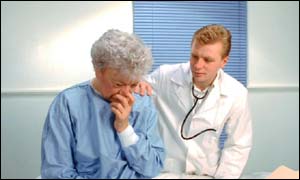| Doctors need to spend more time
brushing up on their communication skills, their own trade union has suggested.
The British Medical Association has acknowledged that some doctors are unable to talk effectively with patients. Officials said work-related pressures were often to blame but they also acknowledged that some doctors simply lack the skills. In a discussion paper published on Tuesday, they urged the NHS to ensure doctors had the time to undertake training. Students at medical school are taught about the importance of talking effectively with patients. However, many older doctors have never had formal training. Medical scandals The BMA paper urges doctors to take steps themselves to ensure they are communicating effectively with patients. It highlights recent inquiries into medical scandals at Bristol Royal Infirmary and other hospitals which highlighted the need for better communication. Dr Peter Dangerfield, chairman of the BMA's board of medical education, called on doctors to carry out a self-assessment of their own skills. "Research has shown that communication between doctors and patients, and training in these skills, has vastly improved in recent years. "Doctors must actively strive to achieve good communication by evaluating their own skills and education providers need to ensure that training opportunities are available to help doctors develop and refine their skills," he said. Dr Vivienne Nathanson, head of professional activities at the BMA, added: "Continual appraisal of a doctor's ability to communicate is an essential part of their professional development. "Doctors must be fully supported to enable them to appraise and update their skills where necessary." Training plans The Department of Health announced plans last year to offer lessons to doctors and other NHS staff on how to be nice to patients. The programme, which will be run by psychologists, will aim to ensure staff are more sensitive to patients and avoid making gaffes or outbursts. Mike Stone, director of the Patients' Association, said communication skills were a key part of the doctor patient relationship. "Communication skills are very, very important. It is the very basis of the relationship between doctors and patients. "It is key that doctors are trained in communication skills. While most have now received training many older doctors have not. Some of these say they don't need any training." Speaking to BBC News Online, he added: "It is also important that patients communicate effectively with doctors. If they cannot tell doctors clearly what is wrong with them then they cannot receive the treatment they need." Dr Francis Szekely, of the Medical Defence Union, which provides medical indemnity for doctors, also stressed the importance of good communication skills. "Communication problems are an issue in almost every single claim and complaint against a doctor." She added: "Many doctors have to learn their communication skills. We would certainly welcome and many doctors would welcome the opportunity to improve those skills." |
|
|
